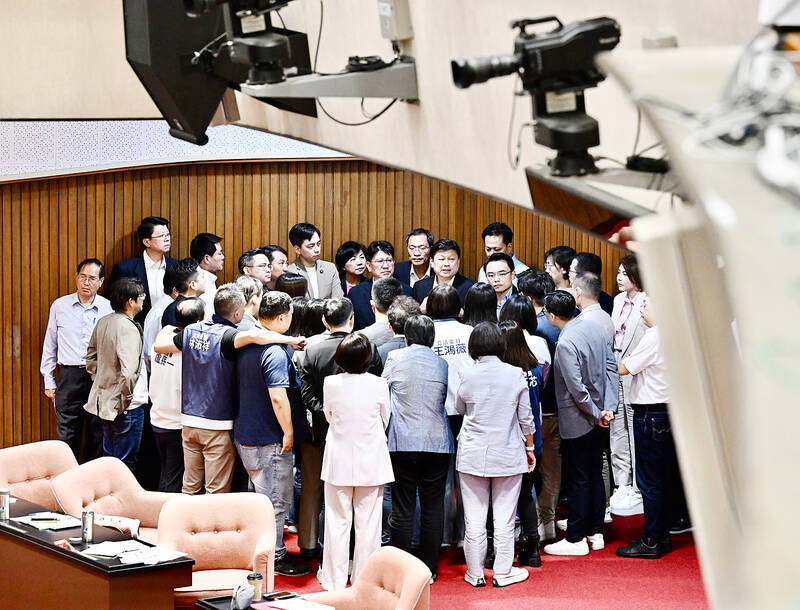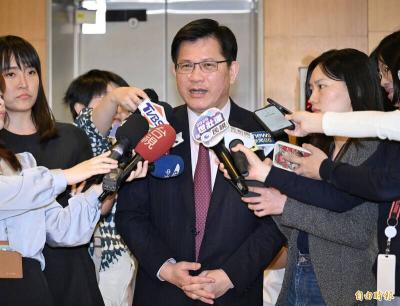Opposition lawmakers yesterday used their majority to pass the second reading of amendments that would require photocopies of ID cards for recall election petitions, with Democratic Progressive Party (DPP) lawmakers saying it is a move to save another politician.
Clashes erupted over voting on amendments to the Public Officials Election and Recall Act (公職人員選舉罷免法) proposed by Chinese Nationalist Party (KMT) caucus whip Fu Kun-chi (傅?萁) and KMT Legislator Hsu Yu-chen (許宇甄).
While the DPP caucus motioned that the bill be returned to the Procedure Committee for review, the KMT caucus proposed to send it directly to a second reading and completed the reading process with the Taiwan People’s Party (TPP) caucus, using their combined majority.

Photo: Lo Pei-de, Taipei Times
Fu’s draft would require signatories to submit a copy of the front and back of their ID card, showing its issue date.
Hsu’s draft also stipulates imprisonment of no more than five years or a fine of up to NT$1 million (US$30,712) for those who forge a signature, and would invalidate signatures of those who do not have an ID card copy.
There have been many falsified petition signatures and petitions raised by impostors in recent recall proposals, Fu said in the draft.
Although the household registration system can help spot and remove the signatures of people who are deceased, it cannot identify forged signatures of people who are alive, he said.
DPP Legislator Wu Ping-jui (吳秉叡) during the legislative session proposed to retrieve his draft amendment, which also requires the issue date of a signatory’s ID card.
Wu completed the retrieval, as opposition lawmakers had no objections, despite some KMT lawmakers saying they would support his proposal.
Fu and Hsu’s amendments are “a forfeiture of civil rights,” and put people’s recall right in a birdcage, DPP lawmakers said during the second reading of the bill.
The KMT clearly forced the second reading to save Keelung Mayor George Hsieh (謝國樑), who has been subjected to a recall petition, DPP legislative caucus secretary-general Rosalia Wu (吳思瑤) said.
The bill would require cross-caucus negotiations and could not be settled during the session, even though its second reading was completed yesterday, she said.
There are other important bills to be approved in the past two days of the session, Wu added.
Separately, amendments to the Act Governing Relations Between the People of the Taiwan Area and the Mainland Area (臺灣地區與大陸地區人民關係條例) proposed by DPP Legislator Puma Shen (沈伯洋) were again blocked by the KMT and TPP caucuses yesterday.
The bill proposed to require lawmakers and councilors to gain approval before visiting China and to report on who they would meet with in China, Hong Kong and Macau.
Although the DPP caucus motioned that the bill be added to the agenda yesterday, opposition lawmakers referred it back to the Procedural Committee, after they had hindered its proceedings multiple times during committee meetings.
However, the DPP’s proposal to schedule a review of the Cabinet’s nominees for the National Communications Commission did not receive objections from the KMT and TPP caucuses yesterday, even though they had been boycotting the bill since its submission in May.
Meanwhile, members of the Economic Democracy Union and other civic groups convened an impromptu news conference outside the Legislative Yuan, saying that opposition lawmakers were ramming through the second reading of the recall election amendment.
“History will record this ugly performance by TPP caucus whip Huang Kuo-chang (黃國昌), union executive Hsu Kuan-tze (許冠澤) said.
Huang, who had vehemently fought against requiring copies of personal IDs when signing recall petitions in the past, has betrayed his principles, Hsu said.
Hsu also called on people to attend a series of protests next week for a return of the “Bluebird Movement” outside the legislature.
Additional reporting by Jason Pan and CNA

Taiwan would welcome the return of Honduras as a diplomatic ally if its next president decides to make such a move, Minister of Foreign Affairs Lin Chia-lung (林佳龍) said yesterday. “Of course, we would welcome Honduras if they want to restore diplomatic ties with Taiwan after their elections,” Lin said at a meeting of the legislature’s Foreign Affairs and National Defense Committee, when asked to comment on statements made by two of the three Honduran presidential candidates during the presidential campaign in the Central American country. Taiwan is paying close attention to the region as a whole in the wake of a

Chinese Nationalist Party (KMT) Chairman Eric Chu (朱立倫), spokeswoman Yang Chih-yu (楊智伃) and Legislator Hsieh Lung-chieh (謝龍介) would be summoned by police for questioning for leading an illegal assembly on Thursday evening last week, Minister of the Interior Liu Shyh-fang (劉世芳) said today. The three KMT officials led an assembly outside the Taipei City Prosecutors’ Office, a restricted area where public assembly is not allowed, protesting the questioning of several KMT staff and searches of KMT headquarters and offices in a recall petition forgery case. Chu, Yang and Hsieh are all suspected of contravening the Assembly and Parade Act (集會遊行法) by holding

President William Lai (賴清德) has appointed former vice president Chen Chien-jen (陳建仁) to attend the late Pope Francis’ funeral at the Vatican City on Saturday on his behalf, the Ministry of Foreign Affairs said today. The Holy See announced Francis’ funeral would take place on Saturday at 10am in St Peter’s Square. The ministry expressed condolences over Francis’ passing and said that Chen would represent Taiwan at the funeral and offer condolences in person. Taiwan and the Vatican have a long-standing and close diplomatic relationship, the ministry said. Both sides agreed to have Chen represent Taiwan at the funeral, given his Catholic identity and

Taiwan would welcome the return of Honduras as a diplomatic ally if the next president of that country decides to make such a move, Minister of Foreign Affairs Lin Chia-lung (林佳龍) said today. “We would welcome Honduras if they want to restore diplomatic ties with Taiwan after their elections,” Lin said during a legislative hearing. At the same time, Taiwan is paying close attention to the Central American region as a whole, in the wake of a visit there earlier this year by US Secretary of State Marco Rubio, Lin said. Rubio visited Panama, El Salvador, Costa Rica and Guatemala, during which he